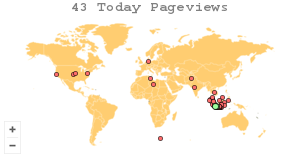KHUSYŪ‘ DALAM AL-QUR’AN (STUDI ANALISIS TAFSIR AL JĀMI‘ LI AHKĀM AL-QUR’AN)
DOI:
https://doi.org/10.47498/bashair.v1i2.657Keywords:
Khusyu', al-Qurthubi, Qur'anAbstract
This research focuses on the concept of khusyu' contained in Tafsir Al Jāmi' Li Ahkām Al-Qur'an written by Imam Al-Qurtubi in depth and comprehensively. The method used is descriptive analytical. This research is based on a literature review using various books in the library and digitally that can be accessed easily. The results of this study indicate that khusyu' interpreted by Al-Qurtubi can be implemented into various activities such as Gaining peace of mind, Strengthening soul and mentality, Always remembering the hereafter, Avoiding a hard heart, Gaining an attitude of Tawadhu' to God as well as to others, Gaining Attitude Tawadhu 'to Allah as well as to others, and Leads to luck and success in life.
References
Abdul Rahman Ibn Nasir Ibn al-Sa’di. (n.d.). Taisiru al-Karim al-Rahman. Muassasah al- Risalah.
Abidin, A. Z., & Zulfikar, E. (2017). Epistemologi Tafsir al-Jami’ li Ahkam al-Qur’an Karya al-Qurtubi. KALAM, 11(2). https://doi.org/10.24042/klm.v11i2.1326
Afri Sukandar. (2021). Tafsir Khusyu’ dalam Kitab Tafsir Al-Misbah.
Aizul Maula. (n.d.). Makna Khusyū’ Dalam Al-Qur’an:Studi Tafsir Tematik.
Al-Qurtubi. (2007a). Tafsir al-Qurtubi (D. Ter. Dudi Rosyadi, ed.). Jakarta: Pustaka Azzam.
Al-Qurtubi. (2007b). Tafsir Al-Qurtubi (Jilid 1).
Al-Qurtubi. (2007c). Tafsir Al-Qurtubi (10th ed.).
Ambo Asnan Kasogi. (n.d.). MAKNA KHUSYU’ DALAM SHALAT (STUDI KOMPARATIF ANTARA TAFSIR AL-AZHAR DAN TAFSIR AL-MARAGHI). 148, 148–162.
Arifin, M. Z. (2018). Konsep khusyuk dalam al-qur’an. Tesis Sarjana.
Hasbi, T. . al-S. (2000). Tafsir al Qur’an al-Majid al –Nur. Semarang: Pustaka Rizki Putra.
Ibnu Mandzur. (2009). Lisanul Arab (2nd ed.). Beirut: Dar al-Kutub al ‘Ilmiyyah.
Ibnu Qayyim Al-Jauziyah. (1998). Madarijus-Salikin (Pendakian Menuju Allah) (Kathur Suhardi, ed.). Jakarta: Pustaka Al-Kautsar.
M. Faudah Basuni. (1987). Tafsir-Tafsir Al-Qur’an: Perkenalan dengan Metode Tafsir. Bandung: Penerbit Pustaka.
M. Quraish Shihab. (2015). Tafsir al-Misbah : Pesan, Kesan, dan Keserasian al Qur’an (7th ed.). Jakarta: Lentera Hati.
M. Yusuf dkk. (2004). Studi Kitab Tafsir. Yogyakarta: Teras.
Moh. Roqib. (2016). Filsafat Pendidikan Profetik Pendidikan Islam Integratif dalam Perspektif Kenabian Muhammad. Purwokerto: Presma An-Najah Press.
Muhammad Nasib ar-Rifa’i. (2012). Kemudahan dari Allah: Ringkasan Tafsir Ibnu Katsir. Jakarta: Gema Insani.
Mustaqim, A. (2015). Metode Penelitian Al-Qur’an dan Tafsir. Yogyakarta: Idea Press.
Ragib al Asfahaniy. (2004). Mujam Mufradat AlfÄzÌ£ al-Qur’an (Dar al-Kutub al-Ilmiyyah, ed.). Beirut.
Rizal Ibrahim. (2007). Rahasia Salat Khusyuk. Yogyakarta: Diva Press.
Sahara, P. (2019). KONSEP KHUSYŪ ‘ DALAM AL- QUR ’ AN ( SUATU KAJIAN DENGAN PENDEKATAN SEMANTIK TOSHIHIKO IZUTSU ) PROGRAM STUDI ILMU AL- QUR ’ AN DAN TAFSIR FAKULTAS USHULUDDIN 1440 H / 2019 M.
Sari, L. M. (2019). KHUSYUK DALAM ALQURAN (KajianTemtatik). Nun : Jurnal Studi Alquran Dan Tafsir Di Nusantara, 4(2), 121. https://doi.org/10.32495/nun.v4i2.70
Sholeh, M. J. (2018). Tafsir al-Qurtubi: Metodologi, Kelebihan dan Kekurangannya. In Jurnal Reflektika (Vol. 49).
Wahbah az-Zuhaili. (2016). Tafsir al-Munir (terj. Abdul Hayyie al-Kattani, ed.). Jakarta: Gema Insani.
Yamimi Amalia. (2017). Khusyu’ Menurut Al-Qur’an (Studi Komparatif Tafsir Lathoif al-Isyarot Karya al-Qusyairi dengan Tafsir al-Azhar karya Hamka).
Downloads
Published
Issue
Section
License
Authors who publish articles in Basha'ir: Jurnal Studi Al-Qur'an & Tafsir agree to the following conditions:
- The author retains copyright and grants the Basha'ir Journal the right from the first publication with the work simultaneously licensed under a Creative Commons Attribution-ShareAlike 4.0 International (CC BY-SA 4.0) license that allows others to make changes, adjust and build on the work with recognition of the author's work and initial publication in the Journal.
- Authors are allowed to copy and redistribute published versions of works in journals (for example, posting them to institutional repositories or publishing them in a book), with recognition of their initial publication in Basha'ir: Jurnal Studi Al-Qur'an & Tafsir.
- Authors are allowed and encouraged to post their work online (for example, in institutional repositories or on their websites) before and during the submission process, as it can lead to productive exchanges, and increase citations of published works






